|
The multitalented Danny John-Jules has tried his hand at everything.
Starting his career as a singer and dancer he went on to play
bit parts in movies including Scum, Little Shop of Horrors
and Blade II. Most people will know him as the well
dressed, yet vain Cat from Red Dwarf, but a new generation
now know him as The Story Makers' Milton Wordsworth.
Darren Rea recently spoke to Danny to find out what he's up
to at the moment, as well as what is happening with the long
overdue Red Dwarf movie...
Darren
Rea: I've got to start by asking you about the Red Dwarf
movie. It's been two or three years now and every time we
hear a rumour that production is going to start... it doesn't...
Danny
John-Jules: [Laughs] I know. It's all crazy for us too. Well...
the latest is that it's definitely going to start filming
in the New Year. I say "definitely" but a few years
of saying "definitely" is not very reliable [laughs].
That's the latest that I've heard from the horse's mouth -
i.e. Doug Naylor. I can only go by that really. Filming is
due to start in Australia on the Gold Coast early in 2004.
DR:
How frustrating has this constant uncertainty of production
been for you? You can't really put your life on hold while
they sort themselves out...
DJJ:
That's the problem, but then again you don't want to be tied
up when everyone else is running off to the Gold Coast with
their new bikini lines and sipping cocktails on the beach.
It's a bit weird.
I've
had to scale down my work on The Story Makers kids'
show that I'm involved with. I could only do a few episodes
- I couldn't commit to other episodes. I'm doing three specials
and it's a matter, for me, of sticking in there because The
Story Makers has been really good for me. I get asked
about it as much as I do about Red Dwarf - it's really
caught the imagination of the kids. So I've got another character...
I'm Milton now. So for the last few years I am recognised
more as Milton and The Cat has been demoted as far as what
people are seeing of him. Milton has a whole new show, and
he's really caught the imagination of the kids. Obviously
I've got to run with that because The Cat is already history
and this new character is where I am now.
DR:
That's the great thing about your career. You've never really
been typecast as a cat character. Since that character became
famous you've played a lot of totally different characters
that were nothing like The Cat. In Maid Marian and Her
Merry Men you played the entrepreneurial Barrington [pictured
below right], in The Tomorrow People you played an
eccentric rock star with a dark secret and your recent role
in Blade II was different again. Since Red Dwarf
Chris Barrie has gone on to play bumbling buffoon after bumbling
buffoon. It must be rewarding to you that you haven't been
offered a string of roles based on shallow, vain characters
like The Cat.
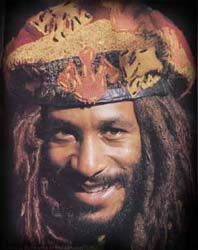 |
DJJ:
Yes, it is. I suppose that on the day, at the audition if
they can see past your previous roles and see that you can
be more than one character it helps. But actors aren't supposed
to be typecast and play the same sorts of role in every movie
that they do. I remember Michael Caine complaining that he
didn't get the credit he deserved. But then Michael Caine
only every played himself in all his movies so he can't grumble.
At least he's working.
I
wouldn't mind being Danny John-Jules if I'm getting £5
million a movie. I'll be Danny John-Jules 24 hours a day for
£5 million. So to get paid a fortune for doing movies
where you play the same character and then complain about
it is odd. There are people in a lot worse positions than
him who are doing great work, playing different characters
every time. It's no use asking for more parts because look
I've done a hundred films. Well that's true, but 98 of them
were crap. But then someone can do four or five characters
one after the other, like you said, that are respected and
accepted characters, but I don't get any scripts dropping
through my door. I'm out there battling for those parts.
DR:
Of all the characters that you have played which was the most
satisfying for you as an actor?
DJJ:
It was actually a character I did on stage. I played an old
Trinidadian man. I had to play the father of an actor who
was actually the same age as me. And for the writer to come
in and tell you that you've captured the character is a great
achievement. I remember getting a glowing review in The
Express back in 1988 after Red Dwarf. And you think
"Wow! I'm going to be bombarded with requests for work".
But that's not how it works. It's
a tough game.
DR:
Are there still race issues in the UK that need addressing?
I remember last time I spoke with you there was some concern
over the making of the failed Red Dwarf USA TV show
where only the white actors from the UK were offered roles
in the US version.
DJJ:
It was funny. You don't know in that situation who tried to
fight for you, but it has always been pushed under the carpet.
If Red Dwarf USA had been a hit and it was on TV every
week, then they would have been saying that they were justified
to make the character changes they did. But, as it was dropped
before it really started, that was enough of a sweetener for
me. Replacing all the original black characters with white
actors didn't work. So at the end of the day they should have
gone with their original black actors from the UK - if you
are going to get turned down, it might as well be with the
original cast.
DR:
Both Chris Barrie and Robert Llewellyn were offered parts
in the US version. Were you and Craig Charles not aware of
any of this at the time?
DJJ:
We didn't have a clue. Robert Llewellyn filmed that year's
series with us, knowing that he was going to America without
us. Me and Craig had no idea that Rob and Chris had been offered
parts in America. They knew before we started the series,
but they never told me or Craig. So we did the whole series
laughing and joking and supporting our brethren, as we do.
We thought something was strange because at the end of every
series Craig would pull Kryten's nose off. The night that
we were ending the series Robert was acting weird and when
Craig pulled off his nose Rob just started crying. We didn't
know why, because he wasn't allowed to tell us. The whole
thing is in his book. Chris Barrie didn't go in the end because
he's paranoid of America and he doesn't like flying a lot
and he wasn't into doing a pilot.
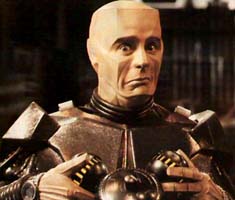 |
In
the end, my part ended up being played by a white woman and
that says it all really. They had Hinton Battle playing my
part first - who was a big song and dance star on Broadway.
My character ended up walking around in an Andrew Lloyd Webber
Cats costume. When they did do the pilot they had the
nerve to use clips from the UK show to sell it. I couldn't
believe it. There I am watching this American pilot with my
performance up there. So they don't give me the job, but they
use me on their tape.
Once
Rob Grant and Doug Naylor got over to America, they realised
they had no power. The script was awful, they were pushed
off the set in the end. I was in America and someone asked
me what I thought of the American pilot. So I said: "You're
American, what do you think of it?" And they hated it.
The
guy who was involved in the Red Dwarf pilot, do you
know what show he ended up doing? Third Rock From the Sun.
If you look at it closely it's very much like Red Dwarf.
Nobody
can play Rimmer like Chris, nobody can play Lister like Craig,
nobody can play The Cat like me, nobody can play Kryten like
Robert and no one plays Holly like Norman. The reason Red
Dwarf worked was that it was a miracle of casting. Everybody
suited their characters so well.
DR:
Looking at your work, your characters are not race specific
- they could easily be played by a Caucasian, an African/American,
a Chinese actor... So do you think there is still a problem
with black actors being typecast in the UK?
DJJ:
If Shakespeare wrote Othello at the start of the 1600s
then we haven't really come very far since then. And if Shakespeare
was so great, why don't they take his lead? Academics rant
and rave about Shakespeare being so great and he wrote a lead
black character all those years ago and how have we progressed
since then?
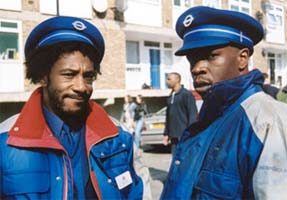 |
I've
just been involved in a new black sitcom for the BBC called
The Crouches [pictured left]. It's written by Ian Pattison,
who wrote Rab C Nesbit. The Crouches is the first black
family sitcom on the BBC for over 20 years. And they are trying
to make out that we should be all happy about this fact, but
it is a travesty that it's taken this long. If Mr Dyke knew
what he was doing, then why did the BBC have a big push called
BBC Talent to look for ethnic minorities when they hadn't
even tapped into the so-called talent that they have there?
Nobody spoke to me about it and I was in three different BBC
shows. No one came up to me and said: "Oh, by the way
Mr Jules, we're looking for some talent." It wouldn't
sound right would it?
There's
a big controversy at the moment, because the first black sitcom
that's been commissioned in the last 20 years has been written
by a Scots man. They wonder why people are going to be up
in arms about it. That's nothing to do with Ian [Pattison]
but someone tried to make an issue about it recently because
there are black writers out there saying: "Well, I sent
in at least three scripts and I've heard nothing back."
So there was a quote in the press recently from Lorraine Heggessey
[Controller of BBC1] explaining that the reason that it was
commissioned was because it was well written. So all the black
folk turn around and start to ask whether that means that
all the stuff that was sent in by black writers before was
crap!
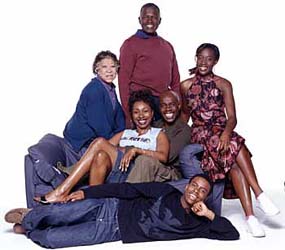 |
It's
contentious. People have been asking when they are going to
get a show for the last 20 years. So the BBC go: "Okay!
There's your fucking show! Take the fucking thing! But the
main point I'm going to lay down is that this Scottish writer
is going to write it! Bollocks to the lot of you!" [laughs]
Ian is a very talented and funny writer, we know that. But
you're not going to stop people getting pissed about it. All
the black writers are going to be pissed about it. Do you
know what I mean?
That's
the sort of situation we have to work through. Why wasn't
this tackled before? All Dyke had to do was say: "There
is no black sitcom out there. Why aren't we commissioning
one? I want something on my table by the end of the month...
or your fired. And the reason I'm firing you is that you couldn't
find an acceptable writer. If your publisher said he wanted
you to interview an ethnic minority that had appeared in one
episode of a show, he would expect results. And that's what
Dyke should have done.
But,
I can't keep relying on someone writing a part for me. Someone
doesn't just sit down and say: "You know what? Let me
write a part for Danny. He's a good old chap." And then
someone turns around and says: "But it's a Viking movie."
"Well,
we can put him in as the ship's cook, or something."
"But
the Vikings are foreign and have blonde hair."
"Oh!
Get him a wig..."
Am
I supposed to rely on the white guys to write me into their
bits? I can't always be inserted into a film dominated by
white characters and make it believable. It's like Robin
Hood and the Prince of Thieves. Barrington is believable
in Maid Marian and Her Merry Men, but seeing Morgan
Freeman in Robin Hood Prince of Thieves was kind of
funny. A black guy in a white Robin Hood story? If it was
a gang it would have made more sense.
It's
like The Cat in Red Dwarf, there are more of us around,
but they've all gone off to fight a holy war. So you believe
The Cat was one of many. And I introduced a female Cat in
the Red Dwarf Tongue Tied music video [pictured right].
DR:
Were you surprised that Tongue
Tied made it into the charts?
DJJ:
No, I wasn't surprised. I knew it would because I was the
one getting the letters about it. People kept asking about
it and where could they get a cassette of it. It would have
been a million Ice Ages before someone at the BBC said: "I
know, let's release a single."
DR:
And when they do realise how popular something is they batter
the hell out of it with all kinds of trashy merchandise.
DJJ:
Exactly, and not giving us anything. It's very much a case
of: "We don't need them now. We own this. Let's put out
loads of merchandise and give them no money."
DR:
That must really piss you off to see your face on a T-shirt
and not to receive anything for it?
DJJ:
Yeah! I was actually talking to Norman Lovett [who plays Holly
in Red Dwarf] and in this business if you took everything
onboard then you would be camped outside the BBC with placards
asking people not to pay their licence fee. The BBC don't
want to give you decent money - even if you are doing a decent
job. People would be surprised if I told them that for the
first series of Red Dwarf I received around £2700
for the whole series. People who pay their licence fee don't
realise and think that you're a millionaire.
DR:
Would you say that landing the role of The Cat has been a
blessing or a curse to your career?
DJJ:
What Red Dwarf has done is given me an audience. I
know when I'm on TV those guys will watch it - they will at
least go and see what I'm doing. It's all about viewing figures
out there and if no one's watching your show then you're off.
The thing is I've got a public that really got to know me
from Red Dwarf and have then gone backwards into my
career to find out what I've done.
DR:
What about your future? You've been involved in singing, dancing,
the theatre, TV, movies... Where do you feel most at home?
DJJ:
Whether I'm working at the theatre, television or film, I
go out there and try to be the best that I can. And so far,
from the feedback that I've received about my work, I seem
to be on the right track. I'll just continue to do what I
do - that's what's gotten me to where I am in my career so
far.
Not
everybody out there is a complete twonk. There are people
out there who do understand what a good performance is and
what a good script is. And there are 1.5 million black folk
in England and they want entertaining. They put a lot of money
into the BBC through their licence fee and we want are money's
worth.
We've
been integrated into the hospital dramas as doctors, which
is all well and good, but where are we represented in the
soaps? As soon as one of the soaps starts to take a fall in
ratings they start asking what is going wrong. And they say:
"I know what! Let's get a new Asian family to move in
and... make one of them Moroccan!" [Laughs] What's it
all about? It's like: "Oh! There's a new black family
joining EastEnders." Can you imagine the estate
agents in your street: "Welcome the Williams family to
Brent. Here they are. The new black family moving into our
street. And we'll tell everyone, so that even the people who
don't like black people know that they've arrived." What
is all this: "Watch our show! There's a new black family
coming?" [laughs].
DR:
There's never been a token oriental family in any of the soaps...
DJJ:
No! That's true. But, in America, it's a different matter.
Over there they've realised that it's all about finance and
so they try and bring in as many communities as possible to
watch their network. Ice Cube has made ten movies in America
and never failed to make money. He's a rapper! How does that
work? Over here, in the UK, the white man can't even make
money in the movie industry. The Arts Council gave British
film makers £100 million and not one of the movies made
money. So it's obvious that we make crap movies.
If
we didn't, Michael Caine would still be here making movies.
Anthony Hopkins doesn't want to live here. He's moved to America.
He's artistic, there's nothing here for him. Guy Ritchie came
along and got lucky. [Lock, Stock and Two Smoking Barrels]
caught the attention of the Brits first. And I was lucky enough
to be in that.
In
this industry I'm always delivering a character for them,
and it's always: "Lovely, lovely, lovely". But once
they are counting the royalties you might as well be missing
in action. When I was working with Guy Ritchie I didn't get
paid until after he made his second movie. I got paid £700
for making that movie. I got half upfront and then I had to
wait two years for the other half. There they are bragging
about how much money they'd made and I still hadn't been paid.
But I didn't complain - I got my money in the end anyway.
DR:
It is a shame how actors in this country are treated. Your
writing can be fantastic, but without a good actor the movie
is going to be rubbish.
DJJ:
That's right. And they gave me that monologue before I accepted
the part.
DR:
There are so many poor actors these days who can't act. They
just play themselves time and time again - but they keep on
working.
DJJ:
Don't even get me started on that subject. They've been lucky.
Once upon a time you at least had to be able to act. When
I was coming up through the ranks the greatest thing was not
being offered anything big. Because, when I go to audition
for a part now I am taking 25 years of experience with me
and not at the bottom end of the scale. I'm ready for anyone.
Hey! I was ready to take on Wesley Snipes. It's good healthy
competition. If Wesley is on screen with me, I'm going to
be working my hardest to look good in a supporting role -
rather than trying to take the film away from him.
DR:
What was that experience like? Didn't you do all your own
stunts, apart from one, on Blade II?
DJJ:
Yes. They wouldn't let me hang upside down from the wire when
the Ninjas come in from the rafters. They wouldn't let me
do that, but I would have - it's no worse than doing a bungee.
That's not bad for my first Hollywood movie. Next time I'll
do all my stunts.
DR:
Thank you for your time.
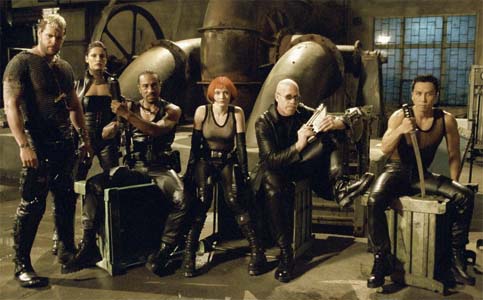
Return
to...

|